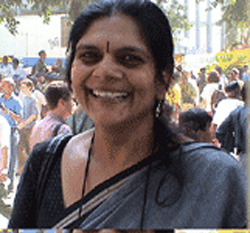
Welcome to the ezine produced by SGI Buddhists that prompts the positive, kindles the constructive, highlights the hopeful and leaves you feeling - well, up!


The lives of thousands of women living in poverty have been transformed by the vision of Chetna Gala Sinha.
By Geraldine Royds
Kamal Jaisinh Gore, a vegetable and milk vendor, is a widow with two children. With a small loan, she was able to buy a buffalo. No longer at the mercy of moneylenders, she is now able to save a few rupees a day.
Polio-stricken Shobha Raut owns her own grocery store,
supporting her parents and paying for her younger brother’s education
while Aruna Gaikwad, who used to earn a meager 44 cents a day as a farm
worker, is now a successful vegetable vendor.
28-year-old Archana Rasal escaped her
alcoholic husband and abusive father-in-law six years ago. Today, she
is a busy seamstress and earns 8,000 rupees ($180) every month allowing
her to raise her daughter by herself.
The lives of these women and thousands like them have been transformed
by the Indian bank, MDMSB, a unique rural cooperative run by and for
poor women.
The bank was founded in 1997 by Chetna Gala Sinha. Although she was
born into a middle class business family in Mumbai, Chetna flouted
tradition by insisting on finishing her education (a Masters in
Economics) before marriage. After meeting and marrying activist and
farmer Vijay Sinha, she left the city to live in one of the poorest
areas of rural India where she learned first hand the difficulties
facing local women.
Although women were largely responsible for the family income, they
weren’t taken seriously as entrepreneurs. They had no assets, no access
to extra money and no social or political power. Although in the past,
they had been known for their skills with animals, many were reduced to
working as day laborers. Because the women, most of them illiterate,
saved their meager earnings with the moneylender, they could easily be
cheated.
Chetna began by working with a group of 25 women shepherds. The women
pooled their savings from one week and went as a group to the market
where one of them was able to buy a goat. These self help groups
(SHGs) expanded allowing the women to forge links in the market and to
support each other. Laxmi Shelar, for example, was married at 13 to a
65 year old. By 17 she was a widow and a social outcast. Now she runs
her own school and is a respected organizer of SHG’s, helping others to
obtain loans and save money.
The MDMSB bank was started to meet the needs of these small producers -
vegetable vendors, milk vendors, nomadic farmers and cottage industry
workers. Unlike other banks, it offered weekly schemes suitable for
casual laborers and daily wage earners. Further, it didn’t disqualify
illiterate women or people from marginalized castes.
We also have male depositors, but we provide finances only through
women," says Chetna Gala Sinha. "We have observed that when women
control household finances, more money is spent on children, education,
health care, and other important domestic requirements."
Chetna then decided that the bank would not just offer financial
support but would organize and train women to create lasting economic
changes. To date, the bank has provided training on how to farm without
using expensive pesticides and fertilizers. It has supported manure
making and local seed banks. Recently, it launched a business school
for girls and women and it has established kiosk centers to help
farmers plan and market their produce. To encourage girls' education,
the bank provides low-interest loans and scholarships for girls and it
has introduced insurance and pension programmes for women.
To stop men selling off household property or driving their wives away
Chetna Gala Sinha introduced a system whereby wives have to be made
co-partners in the family property in order for families to obtain a
loan. "The monetary benefits of a loan encourage the men-folk to
readily agree," she says. The bank has helped as many as 600,000 women
to get a share in the property and it has also convinced the
authorities to include women's names on property papers.
"We have definitely been able to influence two things: education and
awareness of basic rights. Once women are economically independent,
they are empowered and have decision-making powers," says Chetna Gala
Sinha. The women have also increased their access to social power
through the local self-government ‘panchayats’ which are now required
by law to consist of 30 percent women.
With 48,000 members and assets worth 90,000,000 rupees ($2m), the bank has created more than 16,000 women entrepreneurs.
"Our bank demonstrates the effectiveness of microfinance as a financial
tool to reach out to the poorest of the poor. We would like to expand
our activities to encompass migrant workers and street vendors in urban
areas," says Chetna Gala Sinha.
"We have shown that banking with the poor isn't always a loss-making
proposition," she adds. "Each success story has inspired more
innovation and creativity."

